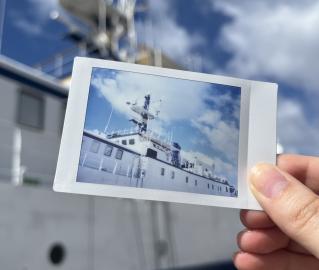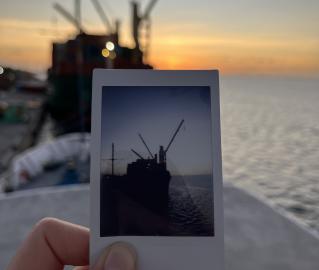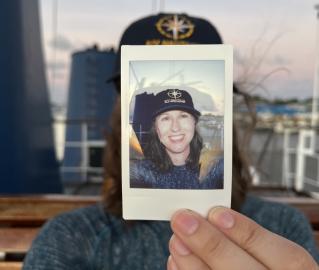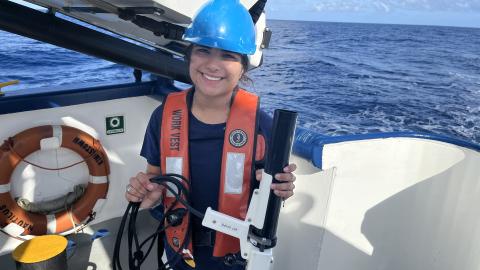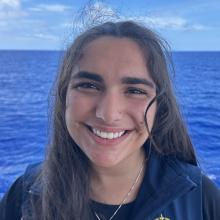
Lexie DelViscio
Tell us about your work/research. What kinds of things do you do?
My current research investigates how the distribution of deep-sea biology, specifically cold-water corals (CWCs), is connected to benthic geology. Understanding these relationships is important because if we can identify the types of benthic environments where CWCs thrive, we can use this knowledge to predict other, unexplored locations where they may also be found. To conduct this work, I use a combination of high-resolution bathymetric maps (which show seafloor depth) and biological annotations from video footage collected by remotely operated vehicles (ROVs). I analyze and visualize this data using software such as ArcGIS, R, and Fledermaus to assess different bathymetric and ecological variables, including depth, slope, rugosity, and species diversity. CWCs are important reef-builders in the deep sea, thriving in extreme environments, making it fascinating to investigate the factors that influence their distribution!
What sparked your initial interest in your career?
Ever since I was young, I have been drawn to the ocean. Climbing the rocky shores of the Maine coast searching for creatures within each tidal pool, hidden in their unique homes of shells, seaweed, and rocks instilled in me a love for science and discovery. As I got older, I realized that I didn’t want to spend my life doing anything other than studying and exploring the ocean! I discovered in undergraduate school how much I was drawn to research via a variety of different projects, and that solidified my decision to pursue my masters in biological oceanography.
Who influenced you or encouraged you the most?
In undergraduate school I was positive I was destined to be a perfect, biology focused, marine biologist, that is until I met a professor named Dr. Leslie Sautter, or "Doc" as all of her student's call her. Doc threw me headfirst into the realm of seafloor mapping when she encouraged me to join the Benthic Acoustic Mapping and Survey Program (BEAMS), which I proudly completed in December 2023. She ensures her students perform to the highest of their abilities and taught me how to look past the surface interpretation, and to always dive deep into data. She, along with my current graduate advisor, Dr. Andrew Davies, who has taught me how to use every tool in a toolbox and offers endless support, have been my largest influences.
What element of your work/study do you think is the most fascinating?
The element of my work I find the most fascinating is the amount of information that is still unknown about the deep ocean. It blows my mind that we statistically are more knowledgeable about space and the surfaces of other planets than we are about the seafloor of our own planet. Every time I analyze a new set of remotely operated vehicle (ROV) footage, or high-resolution bathymetric maps, I feel like I’m uncovering a hidden world.
How did you get involved with the Ocean Exploration Trust?
I applied for SEIP as a seafloor mapping intern after learning about the program in undergraduate school but not having a free enough summer to apply until now. While I have experience in processing and analyzing seafloor mapping data, I have very limited experience on the acquisition side of things, so I thought this was the perfect opportunity to get some hands-on experience!
What other jobs led you to your current career?
While I have been a student my whole life, I’ve had a variety of research experiences across different marine biology and geology fields. I began as a student research assistant writing code for a professor during my sophomore year of college, this position led me to discover how much I enjoy data analysis and coding. Next, I worked with settlement panels to investigate how predation impacts epifaunal communities off of a dock in South Carolina. This opened my interest in benthic and sessile invertebrate communities. Then, during my time as a student researcher in the BEAMS program, I developed skills in multibeam data processing and a passion for deep-sea discovery. These diverse experiences have led me to my current roles as a graduate research assistant for my master’s and a seafloor mapping intern with OET through the SEIP internship.
What are your degrees and certifications?
Bachelor of Science in Marine Biology and minor in data science - College of Charleston 2024
What are your hobbies?
In my free time I enjoy watching hockey (go Caps!), cooking, collecting sea glass/shark teeth, hiking, and reading!
What advice would you give someone who wants to have a career like yours?
Explore everything and anything you are interested in because you never know where it will take you! Also make connections, the people side of science is just as important as the science side of science. Without collaboration and sharing knowledge/ opportunities we wouldn't advance very far in the science world as individuals or regarding discoveries! Lastly, never stop asking questions and trying to learn from those around you, literature, and any other resource you may find.
Expeditions
Lexie participated in the following Ocean Exploration Trust expeditions:
